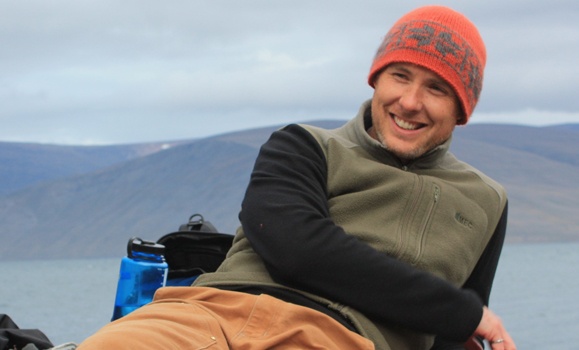Growing up in the small Nova Scotia community of Tatamagouche, everything Rob Jamieson did involved water — whether it was fishing, sailing, or looking for new swimming holes.
“I think I was around 12 years old when I made the connection that the river I was swimming in was actually the water supply for the village of Tatamagouche,” says Dr. Jamieson, a professor in Dal’s Faculty of Engineering and Canada Research Chair in Cold Regions Ecological Engineering. “That was probably when I first started to realize how vulnerable drinking water is, and it spurred my interest in environmental issues.”
That led to a career as an engineer, and Dr. Jamieson now has more than two decades of experience in water resource engineering, with particular expertise in hydrological modelling, water-quality modelling, microbial water quality, and on-site and alternative wastewater systems.
“I had a great high school science teacher, Mr. McLellan, who was probably one of the main reasons I initially went into science and engineering,” says Dr. Jamieson. “But, I definitely have to give my mom the credit for pushing me towards environmental engineering. I was pretty unfocused during my first couple of years of university. She was the one who said I needed to switch things up and suggested I look at environmental engineering, which was a very new discipline at the time. She obviously knew her kid, as I love this job and could not imagine doing anything else.”
Addressing unique water challenges and opportunities
Dr. Jamieson’s research involves examining how ecologically engineered systems can be used for water management in cold climates.
He is aiming is to integrate naturally-occurring biochemical processes in the design of sustainable environmental management systems and assess their potential environmental risks. For example, engineered wetlands for wastewater treatment do not require energy and chemical inputs. These are relatively cheap and easy to maintain, making them an attractive option for small, isolated communities with limited resources.
“For the past decade, I have focused on water and sanitation in Arctic communities, and the use of appropriate technologies to reduce waterborne disease transmission in these challenging environments,” says Dr. Jamieson. “These are issues that are common throughout the circumpolar Arctic.”
His work spans from Nova Scotia to the Canadian Arctic, with a specific focus on rural and remote communities.
“I feel very fortunate that I have been able to travel throughout the Canadian Arctic for my research,” says Dr. Jamieson. “I have met amazing people and seen some spectacular landscapes.”
“What I really consider a highlight, though, is when I can see that my research is actually used in practice. The work we have done has led to the development of new design standards for arctic wastewater treatment systems. The standards are being used to build the next generation of water and sanitation infrastructure in the North.”
In addition, Dr. Jamieson leads an NSERC CREATE program, called ASPIRE, which focuses on restoration of aquatic ecosystems. One of the projects that Dr. Jamieson and ASPIRE students have recently become involved in is a pilot study with the Halifax Regional Municipality and McCallum Environmental on the prevention of an invasive plant, Yellow Floating Heart, in Little Albro Lake. Taking place from May until October, benthic barriers will be placed at the bottom of the lake to prevent further growth of these invasive species. These barriers work by blocking sunlight to the plants and preventing nearby plants from rooting. The results of this study will help inform a plan for removing Yellow Floating Heart from this lake, and provide a valuable training opportunity for students in the ASPIRE program.
Global impact
In 2017, only 71 per cent of the global population used safely managed drinking water and just 45 per cent used safely managed sanitation services, leaving 2.2 billion people without safely managed drinking water, including 785 million without even basic drinking water and 4.2 billion without safely managed sanitation.
That’s why ensuring availability and sustainable management of water and sanitation for all is one of the United Nations’s Sustainable Development Goals (SDG6: Clean Water and Sanitation).
Adopted in 2015, the SDGs outline a path forward for Earth and its inhabitants that leads directly through some of the most pressing, urgent challenges we face. References to these 17 goals can be found throughout Dal’s strategic direction for research and innovation — with each of the plan’s five signature research clusters and two cross-cutting themes tied to specific goals.
This year, Dal ranked among the top 16th [out of 520]) in the world and 3rd in Canada for research, outreach and stewardship in relation to SDG 6 in the Times Higher Education Impact Rankings.
See also: Dalhousie ranks among top 200 universities actively contributing to a better future for everyone
Success in this specific area can be attributed to a combination of institutional efforts to promote sustainable water usage and the strength of research happening in this area. Dr. Jamieson and other researchers at Dal are addressing real challenges faced by the water community and providing a platform for the development and appropriate application of water technology; water quality analysis and advancement; and outreach through knowledge transfer to stakeholders.
“I was very pleased to see that Dalhousie was recognized in this area,” says Dr. Jamieson. “We have a very strong group of researchers working on clean water and sanitation issues, and I think that this will help us continue to identify Dalhousie as an international leader in this field.”
Comments
comments powered by Disqus

